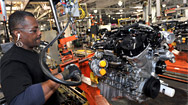Focus on Europe
Europe is the second-largest automotive region for industry sales volumes in the world, behind Asia Pacific and Africa, and it is home to such growing markets as Russia and Turkey.1 Europe is critically important to our ONE Ford plan, representing slightly more than a quarter of our Automotive revenue and vehicle sales volume. It is also an important center of engineering, research and development, supporting all regions of the Company.
Despite overall Company financial progress in 2012, Europe remained a particular challenge, with regional industry sales volume hitting a nearly 20-year low. Ford Europe pre-tax losses for the year exceeded $1.7 billion. Although current economic conditions in the region have certainly played a role, we view the situation there as more structural than cyclical in nature, requiring decisive action.
In October 2012, we outlined our European Transformation Plan, including actions to increase cost efficiencies, address manufacturing overcapacity, accelerate product development and strengthen our brand. We plan to close two U.K. facilities in 2013 – our assembly plant in Southampton and our stamping and tooling operations in Dagenham – and we plan to end production at a major assembly plant in Genk, Belgium, at the end of 2014. The decision to close the plant in Genk is subject to an “information and consultation” process with employee representatives.
The planned actions will reduce vehicle assembly capacity (excluding Russia) by 18 percent, or 355,000 units. The related gross annual savings will range between $450 million and $500 million.
We recognize the impact our actions will have on many employees and their families, and we are working together with all stakeholders as we make these difficult changes to our business in Europe.
In all, the actions will affect 6,200 positions, or about 13 percent of Ford’s European workforce. That includes 4,300 positions in Genk and 1,400 positions in the U.K. Our goal is to achieve employee reductions through enhanced employee separation programs and, with regard to our U.K. facilities, redeployment to other Ford locations. The layoffs also include a previously announced initiative to reduce approximately 500 salaried and agency positions across Europe, with the Ford salaried reductions achieved voluntarily.
Our transformation plan builds upon our earlier announcement that we are launching an unprecedented array of new products – 15 global vehicles, including large cars, sport utilities and commercial vehicles – in Europe over five years. We believe the European market holds potential for profitable growth if we accelerate product development and move decisively to address our costs and overcapacity.
Also in 2012, we took a number of other actions across our European operations in response to the economic downturn. These include reducing line speed and using short-time working days and lay-off days. We also reduced temporary employment in several plants.
In addition, we’re making a strategic shift to reduce vehicle inventory at our European dealerships. Recent improvements in vehicle logistics and information technology systems have sped order-to-delivery time, enabling this change. Reducing inventory will have a long-term, positive effect on profits for both Ford and dealers, while customers will benefit from fresher vehicle inventories, quicker delivery and improved resale values.
Ford is projecting profitability in Europe by mid-decade, driven by higher industry volumes and market share, growth in emerging markets, a richer product mix and improved contribution margin, as well as a more efficient manufacturing footprint. A partial offset will be higher structural costs as we reconfigure and grow the business.
- Although not included among our traditional 19 European markets, Turkey and Russia do contribute to our Ford Europe segment results.










